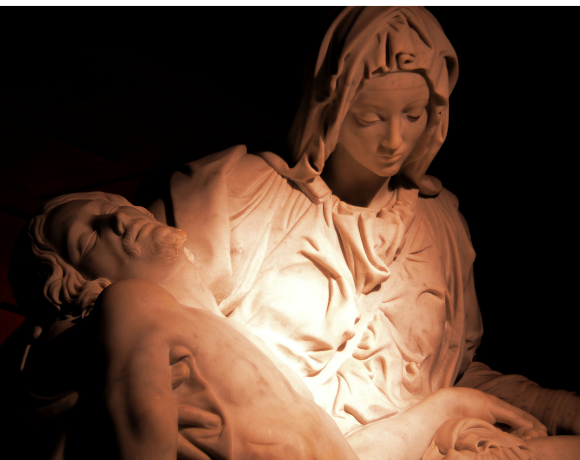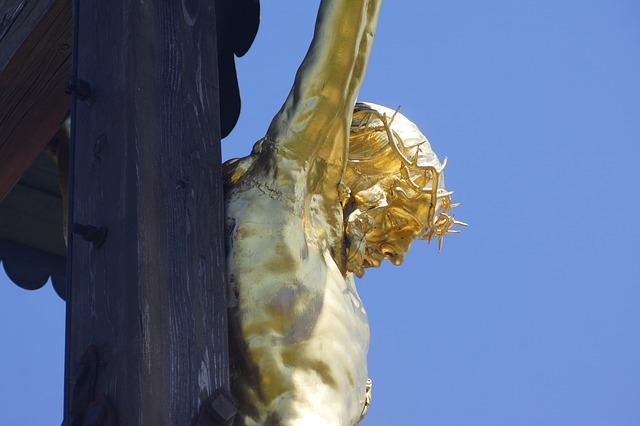
The sacrifice had to be made for the forgiveness of sin; Christ’s death on the cross was necessary to build that bridge of Grace. But the worldly mechanism by which the Messiah was captured and then crucified came from all too human conditions: a bit of greed and a whole lot of political corruption. And as the Good Book says in Ecclesiastes 1:9, “The thing that hath been, it is that which shall be; and that which is done is that which shall be done: and there is no new thing under the sun.” The same fear of accountability and the potential loss of authority by those currently in power can still be seen today.

Despite all their scriptures – what we commonly call the Old Testament today – pointing forward to him, the Jewish religious leaders rejected Jesus. Though they were his own people and grew up reading about the Messiah to come, they simply couldn’t see him as anything but a threat to the status quo with which they had become comfortable. They refused to see that his authority outweighed theirs. “Then came the officers to the chief priests and Pharisees; and they said unto them, Why have ye not brought him? The officers answer, Never man spake like this man. Then answered them the Pharisees, Are ye also deceived? Have any of the rulers or of the Pharisees believed on him? But this people who knoweth not the law are cursed. (John 7:45-49)” In Matthew 12:23 and 24, while the people reacted to seeing Jesus casting out demons by acknowledging him as the Son of David, the Pharisees replied: “This fellow doth not cast out devils, but by Beelzebub the prince of the devils.”
Jesus was a threat to the pride and arrogance of the religious elite as well as their corrupt profiteering. In Matthew 11:19, we see they called him “a man gluttonous, and a winebibber, a friend of publicans and sinners.” John 2: 13-17 recounts Jesus’ cleansing of the temple. Make no mistake – he didn’t just call them out for their corruption; he made a scourge of cords and drove them out of the temple, pouring out their money and overturning their tables. In the third chapter of Mark, the priests watched, hoping to catch Jesus healing a man with a withered hand on the sabbath, then accuse him of violating the law. They didn’t look to prevent it, mind you; they actually wanted a violation so they could have their “gotcha” moment. Knowing their hearts, Jesus asked them, “Is it lawful to do good on the sabbath days, or to do evil? To save life, or to kill it?” Of course, they couldn’t answer the open challenge to their hypocrisy – but after Jesus healed the man, they went straight away to plot his demise.
By Matthew 26:3, the chief priests, the scribes, and the elders of the people gathered before the high priest, Caiaphas, and actively plotted to kill Jesus. In verse 14, Judas Iscariot, one of the 12, went to the chief priests and, for 30 pieces of silver – the price of a slave established in Exodus 21:32 and demonstrated as a contemptuous amount in Zechariah chapter 11 – he betrayed his friend and teacher. In verses 47-57, we see a great multitude with swords came in the night for Jesus, taking him and leading him to Caiaphas and the scribes and elders. In a private hearing, they looked for folks to bear false witness against him but found none. Finally, asking outright if he were the Son of God, they declared him a blasphemer for not denying it and declared him “guilty of death.”

In the morning, they took Jesus to Pontius Pilate, the governor, who had the authority they lacked: the authority to crucify. Out of political fear of his own, Pilate acquiesced – yet still, he tried to give Jesus, who he didn’t really consider to be guilty of anything, an out. In Matthew 27:17-25, the governor offered to release Jesus as an act of mercy – as tradition dictated. But the religious leaders stirred up the masses, and they chose Barabbas, “a notable prisoner,” to go free instead. Again, Pilate acted out of fear of upsetting the status quo, washing his hands of the matter in hopes it would absolve him from having an innocent man killed.
It has been said that absolute corruption corrupts absolutely – though author Frank Herbert once corrected that to “absolute power does not corrupt absolutely, absolute power attracts the corruptible.” From the conspiracies being unraveled by special counsel John Durham’s investigation to the president who proudly flaunts his circumvention of Congress and the checks and balances that keep from him the title His Royal Majesty, the modern political landscape doesn’t look much better than what came before.
But as Jesus pointed out in Matthew 26:53 and 54, he could have stopped it if he wanted, but it had to happen: “Thinkest thou that I cannot now pray to my Father, and he shall presently give me more than twelve legions of angels? But how then shall the scriptures be fulfilled, that thus it must be?” The Lord went willingly to the cross not in spite of the corruption of man but because of it, bearing those sins and all others to the grave where they belong. And for those worried about the state of the nation or even the world today, take heart – just as he rose on the third day, so too will all who believe on him rise again when he returns. As the risen Christ explained to his followers in the second half of Matthew chapter 28, verse 20, “and, lo, I am with you always, even unto the end of the world. Amen.”
Remember to check out the web’s best conservative news aggregator
Whatfinger.com — the #1 Alternative to the Drudge

